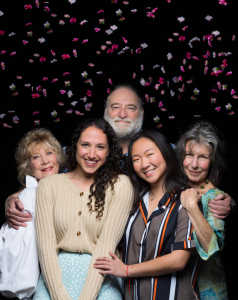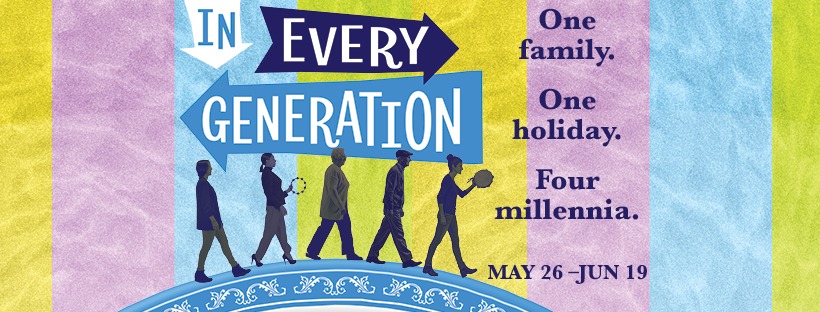Ali Viterbi has been on my radar ever since I attended my first performance of Women of Valor at the San Diego Repertory Theatre. Viterbi co-authored that play with Artistic Director Todd Salovey, Leah Salovey, Sarah Price-Keating, and Rebecca Myers. It continues to showcase San Diego’s very own aishet chailes (women of valor). However, Ms. Viterbi did not stop at recognizing a handful of remarkable Jewish women. She expanded her repertoire to include the importance of Jewish family and community in her play In Every Generation, which opens at the San Diego Rep on May 26.
I saw a staged reading of this play in 2018, and “attended” the Passover seder of the Levi-Katz family. This ritualistic traditional meal features the retelling of the Passover story and the Jews’ exodus from Egypt. The holiday is not only customary but obligatory for members of the tribe. Yet, in every generation, individual predilections and habits are constantly dynamic and reflect the changing behaviors that so often divide us before reuniting us.
Has Viterbi’s play changed over the past four years? “It has changed a lot. We’ve had several developmental workshops. In 2019 the show went to the Kennedy Center, New York, and has come home to San Diego Rep. Many new pages have been added,” Viterbi replied.
I wondered if the story or characters were autobiographical. The author told me, “None of it and all of it. Everything comes from someplace within us.” However, Viterbi assured me that in each of her characters there is an aspect of herself that has been influenced by her own Jewish identity, reinforced by her upbringing in a Jewish home, and attending a Jewish day school. She sees the world through this prism, and developed her characters based on this very perspective.

While every year, Jews re-enact the Passover experience, our rich Jewish traditions allow for changes to suit each individual so that he/she sees himself as if the escape from bondage was his/her authentic journey. “Tradition and time travel connects us to our past and present,” said the playwright. To prove this point Viterbi observed that Jews no longer make sacrifices, but use prayer. Our devotion is now related through art and in our community actions.
It is precisely this aspect of community and family that draws Viterbi to attend shul or observe the laws of kashrut, in tandem with her faith. She described the minyan, a collection of 10 men who come together to observe and share in joys and sorrows, as the bedrock of Judaism.
I was curious to know if the author found herself more sympathetic to different characters as she has grown and as they have developed. She told me that initially, she felt closer to the youngest character, but as she’s been exposed to more life, her perspectives have shifted with global change. Just as her characters have become more dynamic, Viterbi has rewritten the script in response to world events. Awareness of the anti-Semitic component of the Charlottesville march in 2017, the Tree of Life shooting (2018), and the too-close-to-home Poway synagogue shooting (2019) all deepened the writer’s commitment to telling her story and sharing an important message with the world.
COVID clearly impacted Viterbi’s own experience of her favorite Jewish holiday. Previous to the pandemic Ali shared that her mom would cook for months, the playwright would pen a Passover skit and 50 guests would descend upon a table laden with festive, kosher-for-Passover delicacies. Sadly, the virus created a much smaller celebration but fortunately, all the immediate family lives close enough that they had created their own “bubble” and were able to join for the holiday.
In Every Generation is currently enjoying a National New Play Network Rolling Premiere after winning the National Jewish Playwriting contest in 2019. It premiered at Victory Gardens Theater and will return to San Diego Rep before heading to Olney Theater Center next year.
I was eager to know just whom Ali Viterbi credits with fanning the flames of her passion for theater. She said, “My earliest influencers were my grandparents who were consummate storytellers. The stories would heal and bring us together.” In her younger days, Viterbi wrote plays for her sisters to perform. As a teen, Todd Salovey of the San Diego Rep brought Viterbi on board for the Jewish Arts Festival. “He believed in me,” she said. Other mentors include college professors and UCSD playwriting professors Naomi Iizuka and Deborah Stein. The message she received from each of these sources: “Jewish stories are worth telling.”
I couldn’t agree more!


























